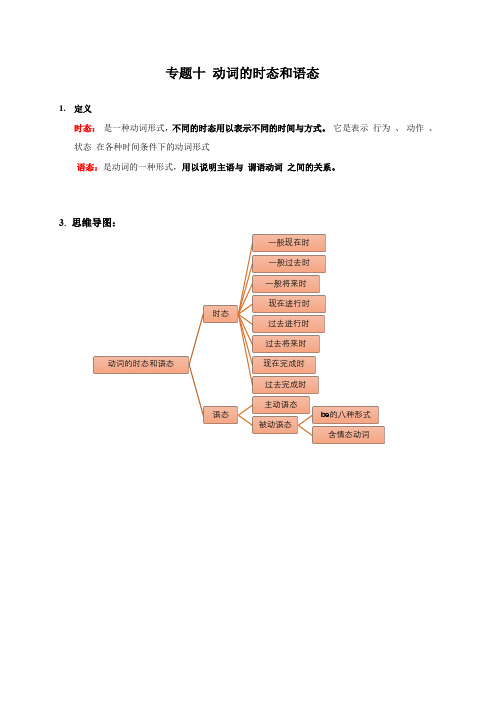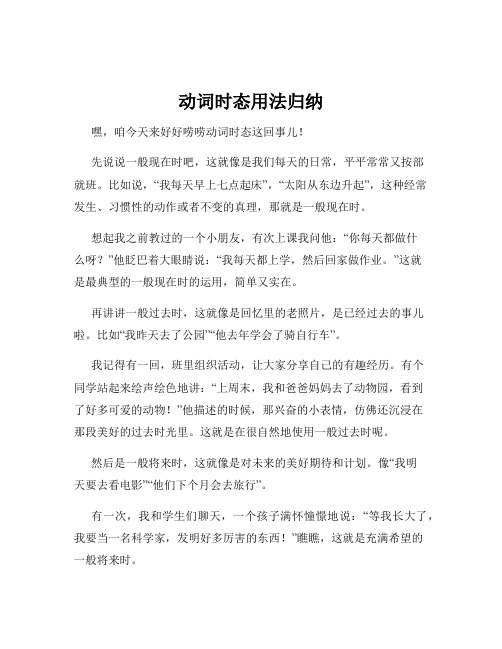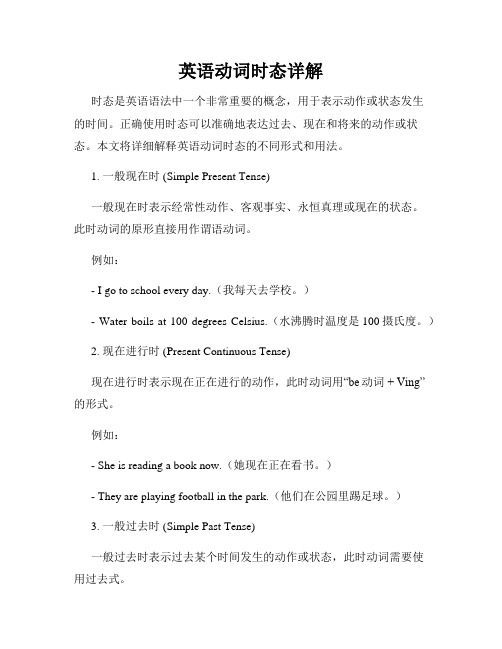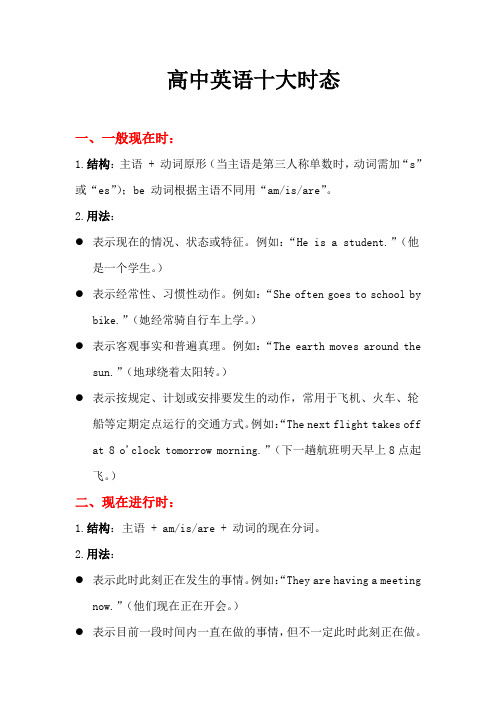精讲十、动词的时态
英语动词时态总结

英语动词时态总结一、一般现在时(Simple Present Tense)表示经常性动作、惯性动作、普遍真理等。
1. 动词原形:- I, you, we, they + 动词原形- He, she, it + 动词原形 + -s/-es2. 特殊用法:- 表示客观事实或普遍真理:The sun rises in the east.- 表示经常性或惯性动作:I often go for a run in the morning.二、一般过去时(Simple Past Tense)表示过去某个时间发生的动作或存在的状态。
1. 动词过去式:- 一般情况下,动词过去式在词尾加-ed。
- 不规则动词过去式需单独记忆。
2. 特殊用法:- 表示过去的经历或事件:We traveled to France last summer.三、一般将来时(Simple Future Tense)表示将来发生的动作或存在的状态。
1. will/shall + 动词原形:- I, you, he, she, it, we, they + will + 动词原形- I, we + shall + 动词原形2. 特殊用法:- 表示决定、承诺、意愿等:I will help you with your homework.四、现在进行时(Present Continuous Tense)表示现在正在进行的动作。
1. be(am/is/are) + 动词-ing:- I + am + 动词-ing- He, she, it + is + 动词-ing- You, we, they + are + 动词-ing2. 特殊用法:- 表示现在进行的动作:I am studying for the exam.五、过去进行时(Past Continuous Tense)表示过去某个时间正在进行的动作。
1. was/were + 动词-ing:- I, he, she, it + was + 动词-ing- You, we, they + were + 动词-ing2. 特殊用法:- 表示过去正在进行的动作:She was watching TV when I arrived.六、将来进行时(Future Continuous Tense)表示将来某个时间正在进行的动作。
动词的时态和语态全析全解

动词的时态和语态全析全解动词时态(tense)是一种动词形式,不同的时态用以表示不同时间里所产生的动作或存在的状态。
从种类上看英语有16种时态,而其中常用的有11种,表中斜体字表示的时态不常用。
动词各时态名称如下:1-4 现在:一般现在时现在进行时现在完成时现在完成进行时2-4 过去:一般过去时过去进行时过去完成时过去完成进行时3-4 将来:一般将来时将来进行时将来完成时将来完成进行时4-4 过去将来:一般过去将来时过去将来进行时过去将来完成时过去将来完成进行时各时态的英语表达结构(以write为例):一般/进行/完成/完成进行1、现在write, writesam/is/are writinghave/has writtenhave/has been writing2、过去wrotewas/were writinghad writtenhad been writing3、将来shall/will writeshall/will be writingshall/will have writtenshall/will have been writing4、过去将来should/would writeshould/would be writingshould/would have writtenshould/would have been writing各时态用法说明一. 一般现在时一般现在时主要由动词原形表示,但第三人称单数作主语时谓语动词后要加-s或-es,另外,be和have有特殊的人称形式。
如:1.一般动词:I know it.You know it.He/She knows it.We/You/They know it.2. 动词be:以am, is, are三种形式出现。
I am a teacher.You are a student.He / She is a student.We/You/They are students.3. 动词have:以have, has形式出现。
初中英语人教版 中考 语法专题 10 动词的时态和语态

专题十动词的时态和语态1.定义时态:是一种动词形式,不同的时态用以表示不同的时间与方式。
它是表示行为、动作、状态在各种时间条件下的动词形式语态:是动词的一种形式,用以说明主语与谓语动词之间的关系。
3. 思维导图:动词的时态和语态时态一般现在时一般过去时一般将来时现在进行时过去进行时过去将来时现在完成时过去完成时语态主动语态被动语态be 的八种形式含情态动词1.动词的时态1.常考的时态构成及用法a.一般现在时d.现在进行时e.过去进行时f.过去将来时g.现在完成时h.过去完成时2. 动词的语态a. 分类:主动语态:表示主语是动作的执行者被动语态:表示并语是动作的执行者c.主动语态和被动语态的转换规则典型例题总分:50分姓名:得分:1.单选题(每小题1分,共50分)( ) 1. Jenny, together with the Greens the White Tower Park if it tomorrow.A.are going to; isn't rainyB.is going to; doesn't rainC.are going to; won't rainD.is going to; isn't rain( ) 2. The old man for quite some time.A.has diedB.dieC.has deadD.has been dead( ) 3. It is reported that a tall building in the city next year.A.will be builtB.were buildC.have builtD.will build( ) 4. My sister for 2 years.A.has marriedB.have got marriedC.has been marriedD.married( ) 5. Chinese ________in many schools around the world and many people love to learn it.A.teachesB.is teachingC.has taughtD.is taught( ) 6. When Tom was in primary school, he ________the piano every day.A.playsB.playedC.was playingD.has played( ) 7. A baby's first month birthday is a special event in China and _____with a special Party.A.celebratesB.is celebratedC.was celebratedD.will celebrate( ) 8. -Were you at home at 9 o'clock last night?-Yes, I a shower at that time.A.tookB.was takingC.was takenD.am taking( ) 9. National Day celebrations for China's seventieth birthday in about three months.A.will be heldB.will holdC.is heldD.was held( ) 10. We don't know if he tomorrow. If he, I will call youA.will come, will comeB.will come, comeses, will comees, comes( ) 11. He told me that he ______ his uncle in Thailand the next day.A.will visitB.has visitedC.is going to visitD.would visit( ) 12. -Tom, do you know ________? -In Beijing.A.where will the 24th Winter Olympics be heldB.where the 24th Winter Olympics will holdC.where the 24th Winter Olympics will be heldD.where will the 24th Winter Olympics hold( ) 13. Peter with his classmates ________ for the bus when the earthquake happened.A.is waitingB.was waitingC.are waitingD.were waiting( ) 14. his museum ________ here for over 80 years. It ________ one of the oldest buildings in this city.A.is; wasB.had been; isC.was; has beenD.has been; is( ) 15. -Mrs. Brown, how long can books from the school library ?-At most two weeks.A.borrowB.keepC.be borrowedD.be kept( ) 16.-An AI robot _____in our school dining hall next term.-I'm looking forward to it.A.will useB.will be usedC.is usedD.was used( ) 17. Usually a baby's face ____ smooth.A.is feelingB.feltC.feels likeD.feels( ) 18. She _____ an English magazine when I came in.A.readsB.has readC.will readD.was reading( ) 19. I will call you as soon as he______ here.A.arriveB.will arriveC.arrivesD.arrived( ) 20. Boys and girl, ______ learning and have fun!A.keepB.to keepC.keepingD.kept( ) 21. There ______a basketball game between these two grades in the gym this afternoon.A.willB.is going to haveC.is going to beD.will have( ) 22. We ______TV from seven to nine last night.A.were watchingB.will watchC.watchedD.watch( ) 23. Jack's mother taught me how ________ Yunnan rice noodles last weekend.A.to makeB.makingC.makeD.to making( ) 24. Mrs. Green said the plates ________ right away,or they would become difficult to wash.A.will be washedB.should washC.will washD.should be washed( ) 25. The documentary Under the Dome (《苍穹之下》)which ________ by Chai Jing showed us that the air pollution in China was very serious.A.producesB.producedC.is producedD.was produced( ) 26. -What did you do last night?- I ________ my homework and watched TV.A.didB.doC.am doingD.will do( ) 27.The hospital is very famous. It _______ in 2001.A.buildsB.builtC.was builtD.is built( ) 28.These rules are made the disabled.A.protectB.protectedC.to protectD.protecting( ) 29. -How much does the TV ?-Not too much. It's just a second-handed one.A.costB.spendC.takeD.pay for( ) 30. -Have you ever ________ an amusement park?- Yes, I have ________ Fun Times Amusement Park last year.A.been to, have gone toB.gone to, have been toC.go to, went toD.been to, went to( ) 31.We are glad to hear that the terrorists ________ by the brave policemen several days ago.A.are caughtB.were caughtC.have been caughtD.are going to be caught ( ) 32. -Why didn't you go to the party last night? - Because I _____.A.wasn't invitedB.didn't invitedC.haven't invitedD.don't invited ( ) 33. -What _____ you supposed ____ when you are in China?- You should shake hands.A.are, to doB.do, to doC.are, doingD.have, to do( ) 34. So far, we ________ English for three years.A.have learntB.learnC.learntD.had learnt( ) 35.The boy was made ______ the words again and again.A.copyB.copyingC.copiesD.to copy( ) 36. The sports meeting in our school now.A.being heldB.is havingC.is holdingD.is being held( ) 37. The window ____ ten minutes ago, and the room is bright now.A.can be cleanedB.is cleanedC.was cleanedD.will be cleaned( ) 38. -Oh, Mrs. King, your necklace looks nice. Is it new?-No, I _______ it for 2 years.A.hadB.have hadC.boughtD.have bought( ) 39. He has ordered a watch on line for his father and it _______ to him before Father's Day.A.sendB.will be sentC.was sentD.sent( ) 40. There ______ a funny cartoon on CCTV 6 this evening.A.willB.will haveC.is going to beD.is going to have( ) 41. -________ did your uncle leave his home town? -He ___________ for nearly twenty years.A.When, has leftB.When, has been awayC.How long, has leftD.How long, has been away ( ) 42. My uncle ________ Germany on business many times.A.has been onB.has gone toC.has been toD.has been in( ) 43. Her life ________ a lot during the last three years.A.changedB.changingC.has changedD.will change( ) 44. -Lisa was seen ______ an old man go across the street this morning. -What a kind girl she is!A.helpingB.helpedC.to helpD.helps( ) 45. My computer has broken down. I'll get it _______ this afternoon.A.repairsB.repairedC.to repairD.repairing。
初中英语知识归纳总结——动词的时态

初中英语知识归纳总结——动词的时态动词的时态(一)教学重点一般现在时在英语中,不同时间里以不同方式发生的动作或存在的状态,要用不同的动词形式来表示,动词的这种不同形式称为动词的时态。
时态从时间上划分,可分为四大类:现在时;过去时;将来时;过去将来时。
从行为上,每一类可以分为四种形式:一般式;进行式;完成式;完成进行式。
这样英语的动词合起来,总共有十六种时态,初中只需掌握其中的八种时态。
1、一般现在时(1)一般现在时表示现在的状态、习惯性的动作或主语所具备的性格和能力等。
①当动词是be时,第一人称用am,第二人称用is,其他人称用are.②当动词是实义动词时,一般用动词原形,但如果主语是第三人称单数时,动词必须用第三人称单数形式,其变化规则如下:助动词do(第三人称单数用does)构成否定句、疑问句及答语,但要注意助动词后原来的谓语动词要恢复原形。
例如:I like music.I don’t like music.Do you like music?Yes, I do No, I don’t(2)一般现在时的用法①表示经常、习惯性动作,常和often, usually, every day, sometimes, always 等时间状语连用。
如:He goes to school by bus every day.They often play football②表示能力、职业、特征。
如:Miss Gao teaches English.Do you speak Japanese?③表示客观存在。
如:The earth moves round the sun.Time and tide wait for no man.④表示已经安排好或计划好的事。
如The plane takes off at 7:30.Classes begin at 8:00⑤在时间状语和条件状语从句中,主句用一般将来时,从句用一般现在时。
动词时态详解

动词时态详解动词时态是指动词表示的动作或状态所发生的时间。
在英语中,有多种不同的时态,每种时态都有其独特的用法和含义。
以下是对一些常见动词时态的详细解释:1. 现在时态 (Present Tense)- 一般现在时 (Simple Present): 用于表达经常性的动作、客观事实、普遍真理等。
- 现在进行时 (Present Continuous): 用于表示正在进行的动作。
- 现在完成时 (Present Perfect): 用于表示过去发生的动作与现在的关系,强调结果或经验。
- 现在完成进行时 (Present Perfect Continuous): 用于表示过去开始并一直持续到现在的动作。
2. 过去时态 (Past Tense)- 一般过去时 (Simple Past): 用于表达过去发生的动作或状态。
- 过去进行时 (Past Continuous): 用于表示过去某一时刻正在进行的动作。
- 过去完成时 (Past Perfect): 用于表示过去某一动作或状态在另一过去时间点之前发生。
- 过去完成进行时 (Past Perfect Continuous): 用于表示过去某一时间点之前已开始并持续到另一时间点的动作。
3. 将来时态 (Future Tense)- 一般将来时(Simple Future): 用于表示将来发生的动作或状态。
- 将来进行时 (Future Continuous): 用于表示将来某一时刻正在进行的动作。
- 将来完成时 (Future Perfect): 用于表示将来某一时间点之前已经完成的动作。
- 将来完成进行时 (Future Perfect Continuous): 用于表示将来某一时间点之前已开始并持续到另一时间点的动作。
以上是关于常见动词时态的简要说明。
对于每种时态,还有其他细节和规则需要进一步了解和掌握。
在使用动词时态时,确保根据具体语境和需要选择合适的时态,以便准确地表达你的意思。
动词时态的全面解析准确运用过去现在和将来时

动词时态的全面解析准确运用过去现在和将来时动词时态的全面解析及准确运用过去、现在和将来时动词时态是英语语法中的一个重要部分,它用来表达动作或状态发生的时间。
正确地运用时态可以使句子更加准确、流畅,并能够有效传达我们所要表达的意思。
本文将对动词时态进行全面解析,并指导如何准确运用过去时、现在时和将来时。
1. 过去时(Past Tense)过去时用于描述已经发生过的动作或状态。
一般过去时表示的是过去某个特定时间发生的动作,例如:I watched a movie last night.(昨晚我看了一部电影。
)He lived in London for five years.(他在伦敦生活了五年。
)除了一般过去时外,过去时还有以下几种形式:1.1 过去进行时(Past Continuous Tense)过去进行时表示过去某一时间正在进行的动作,或过去某一时间段内连续发生的动作,例如:I was watching a movie when she called me.(她给我打电话时,我正在看电影。
)They were playing basketball from 4 pm to 6 pm yesterday.(昨天从下午4点到6点,他们一直在打篮球。
)1.2 过去完成时(Past Perfect Tense)过去完成时表示在过去某个时间之前已经发生的动作,例如:She had already finished her homework before he arrived.(他到之前她已经完成了作业。
)They had known each other for ten years before they got married.(他们在结婚前已经认识了十年。
)1.3 过去完成进行时(Past Perfect Continuous Tense)过去完成进行时表示过去某一时间之前一直在进行的动作,例如:I had been waiting for two hours when the bus finally arrived.(公交车最终到达时,我已经等了两个小时了。
高中英语动词时态语态精讲及练习

高中英语动词时态语态精讲及练习一、时态(一)现在进行时用法注意点:1.状态性动词不用进行时态,包括(1)be和have,或者含有be 和have意义的动词,如:belong to, cont ain, depend on,等;(2)feel, sound, smell, taste等连系动词;(3)hear, see, find等表示结果的动词;(4)表示心理或情感状态的动词,如:believe, love, want, understan d, wish等;2.进行时态和副词always, forever等连用时,往往带有一定的感情色彩,如颂扬、批判、不满、埋怨等;eg. He is always criticizing us.(二)一样过去时与过去进行时的区别:1.过去进行时表示动作的未完成性、连续性,着眼于动作的过程;一样过去时表示动作的完成,即动作发生过,且已终止,着眼于结果;如:She was writing a report last night and I don’t know if she has fin ished it.(昨晚一直在写)She wrote a report last night.(表示昨晚写了,同时写好了)2.过去进行时与always, forever等词连用表示一定的感情色彩;He was always throwing things about. (表示不满或厌恶)(三)今后时的几种表达:还可用一样现在时、现在进行时表示今后发生的动作;(四)今后进行时与今后完成时:1.今后进行时表示今后某一时刻发生的动作,结构为:will / shall be doing2.今后完成时表示到今后某时刻某动作已发生,结构为:will / shall h ave done,时刻状语为:by+表今后时刻的词语;如:I’ll be climbing the mountain this time the day after tomorrow.By the time he graduates from the college, he will have learned thre e foreign languages.(五)现在完成时及过去完成时的用法注意点:1.瞬时性动词与连续性动词的正确使用:与how long, for, since等表示一段时刻的状语连用时须用连续性动词,如:die-be dead, marry-be ma rried, begin-be on, begin to know-know等;2.注意have been to与have gone to的区别;4.by+过去时刻状语用过去完成时;5.有些动词的过去完成时表示过去未曾实现的意图、打算或期望,这类动词为:think, plan, mean, intend, hope, expect, suppose等;I had intended to visit you yesterday, but the rain prevented me.(六)现在/过去完成进行时的用法:强调动作连续到说话时且还在进行;结构:have (has) / had been doing比较:They have repaired the road.(表示路已修好)They have been repairing the road. (表示路还在修)有时两者可替换:She has taught in this middle school for ten years.She has been teaching in this sch ool for ten years.注意:完成进行时不可与瞬时性动词连用,如:finish, go, marry等;(七)某些固定句型中时态是固定的:1.This / That / It is the first time +从句(用现在完成时)2.It’s / has been +一段时刻+since从句(用过去时)3.It will be +一段时刻+before从句(用一样现在时)/ It was +一段时刻+before从句(用过去时)4. It’s time+从句(用过去时或should do)5.would rather+从句(用一样过去时/过去完成时)It’s getting late. I’d rather you took a taxi there.The film was boring. I’d rather I hadn’t gone to see it.二、语态语态概述英语的语态是通过动词形式的变化表现出来的。
高中英语 动词的时态、语态和主谓一致精讲

(3)表示人的“观点” “看法” “建议” “态 度” “评价”等词、“活动的目的”以及客观 事实时,常用一般现在时。
A good medicine __t_a_s_te_s__(taste) bitter. Our geography teacher told us that the earth __g_o_es_(go) around the sun.
2
(2)用于状语从句代替一般将来时 在when , as soon as , before , after , until , if 等引 导的时间状语或条件状语从句,谓语动词是将来 时通常用一般现在时代替。 “主将从现”
If he succeeds(succeed), he will be the hero of human beings.
Terry and his wife were tidying up their new home busilyw_h_e_n_ the light suddenly went out.
I was about to go out w__h_e_n the telephone rang.
9
6.现在完成时 构成形式: 助动词have/has + 动词的过去分词
4
2.一般过去时 构成形式 did
表示过去某一时间点发生的动作或所处的状态.
注意:一般过去时往往和明确的过去时间状语连 用.如: yesterday, last night, two days (months, weeks) ago, in 1996, the other day也常和when, if 等 引导的状语从句连用.
10
So far, it has turned (turn) the most influential student activity in the world.
2015中考英语(人教)语法专题复习:专题十 动词的时态(共55张PPT)

The twins will go to the cinema with their 例句 parents tonight. 这对双胞胎今晚和父母一起
去看电影。
备注 在时间和条件状语从句中,用一般现在时代 替一般将来时。
种类
现在进行时(2014年,2013年各2次,2012 年4次)
1.现在时刻动作:目前正在发生的动作。
第二部分 语专题突破
专题十 动词的时态
考点精析
分析近三年湖南中考真题可以看出,动词的时 态是湖南中考的必考点,且考查点较多。考查形式
为单句(词数6~20词左右,且以8词居多)和对话
(词数 11 ~ 20 词之间),且设空主要为 1 空,偶尔 涉及 2 空。话题倾向于休闲娱乐、假期计划、日常 生活,无热点信息。语境丰富,易于理解,无生词。
意义 2.现阶段动作:目前一个时期一直在进行的 动作,此刻不一定在进行。 构成 特点 时间 标志 am/is/are+动词的现在分词
now, at present, at the moment, these days, look, listen
词
例句
Look! What are the children doing over there? 看,孩子们在那边做什么? come, go, leave等少数动词的现在进行时形式 可表示将要发生的动作。
We went to the History Museum last Monday. 例句 上周一我们去了历史博物馆。 I was busy yesterday. 我昨天很忙。 备注 /
种类 一般将来时(2014年、2012年各3次) 意义 将来的动作或状态 构成 1.will(shall)+动词原形 特点 2.be going to+动词原形 时间 tonight, tomorrow, the day after tomorrow, 标志 from now on, soon, in the future, next year, 词 next week/month/term...(next系列)
动词的时态和语态知识总结

动词的时态和语态知识总结一、动词的时态时态是指动词所表示的动作或状态发生的时间。
英语中常用的时态有以下几种:一般现在时、一般过去时、一般将来时、现在进行时、过去进行时、将来进行时、现在完成时、过去完成时、将来完成时等。
1. 一般现在时一般现在时表示经常性、习惯性的动作或客观事实。
常与频率副词如always、often、usually等连用。
例如:- I often go to the gym.- He always arrives on time.2. 一般过去时一般过去时表示过去某个时间发生的动作或存在的状态。
常与表示过去的时间状语连用。
例如:- I visited my grandparents last weekend.- She lived in Paris for two years.3. 一般将来时一般将来时表示将来某个时间要发生的动作或存在的状态。
常与表示将来的时间状语连用。
例如:- We will have a meeting tomorrow.- He is going to travel to Japan next month.4. 现在进行时现在进行时表示现在正在进行的动作。
常由be动词的现在分词形式(-ing)构成。
例如:- They are watching a movie right now.- I am studying for my exams.5. 过去进行时过去进行时表示过去某个时间正在进行的动作。
常由be动词的过去分词形式(-ing)构成。
例如:- She was cooking dinner when I arrived.- They were playing football at that time.6. 将来进行时将来进行时表示将来某个时间正在进行的动作。
常由be动词的将来分词形式(be going to + 动词的现在分词形式)构成。
例如:- They will be having a party this time next week.- I am going to be studying abroad next year.7. 现在完成时现在完成时表示过去某个时间发生的动作对现在造成的影响或结果。
中考英语总复习 专题10 动词的时态和语态课件

归纳现在进行时的构成
主语+am/is/are+动词-ing形式
现在进行时的用法
1.表示(biǎoshì)现在(指说话人说话时)正在发生的事情。如: We are waiting for you. 我们正在等你。 2.表示当前一段时间内的活动或现阶段正在进行的动作。如: Mr.Green is writing another novel these days.
A.takes B.took
C.will take D.has taken
第五页,共二十三页。
归纳一般过去时的构成
主语+was/were/did+其他 一般过去时的用法 (1)表示过去某个时间或某一段时间内发生的动作或存在(cúnzài)的状 态。常见的时间状语有:yesterday,last week,an hour ago,the other day,in 1982等。如: Where did you go just now?
您还要些什么吗?
I wondered if you could help me. 我在想你能不能帮我一下。
②情态动词 could,would。如:
Could you lend me your bike? 你的自行车能借我用一下吗?
第七页,共二十三页。
(三)现在(xiànzài)进行时
第八页,共二十三页。
(一)常考的被动语态
A.Invites
C.was invited
B.is invited
D.has invited
第十八页,共二十三页。
2.(2017—2018学年(xuénián)安徽合肥蜀山50中西区第三次月考)If more salt
C to the soup,it will taste better. A.will add B.adds C.is added D.will be added 3.(2018·安徽合肥庐阳区二模,44)All the people I have known in the past three
动词时态用法归纳

动词时态用法归纳嘿,咱今天来好好唠唠动词时态这回事儿!先说说一般现在时吧,这就像是我们每天的日常,平平常常又按部就班。
比如说,“我每天早上七点起床”,“太阳从东边升起”,这种经常发生、习惯性的动作或者不变的真理,那就是一般现在时。
想起我之前教过的一个小朋友,有次上课我问他:“你每天都做什么呀?”他眨巴着大眼睛说:“我每天都上学,然后回家做作业。
”这就是最典型的一般现在时的运用,简单又实在。
再讲讲一般过去时,这就像是回忆里的老照片,是已经过去的事儿啦。
比如“我昨天去了公园”“他去年学会了骑自行车”。
我记得有一回,班里组织活动,让大家分享自己的有趣经历。
有个同学站起来绘声绘色地讲:“上周末,我和爸爸妈妈去了动物园,看到了好多可爱的动物!”他描述的时候,那兴奋的小表情,仿佛还沉浸在那段美好的过去时光里。
这就是在很自然地使用一般过去时呢。
然后是一般将来时,这就像是对未来的美好期待和计划。
像“我明天要去看电影”“他们下个月会去旅行”。
有一次,我和学生们聊天,一个孩子满怀憧憬地说:“等我长大了,我要当一名科学家,发明好多厉害的东西!”瞧瞧,这就是充满希望的一般将来时。
现在进行时呢,就是正在发生的事儿,好比眼前正在播放的精彩画面。
比如“我正在写作业”“他们正在踢足球”。
有一回我路过操场,看到一群孩子在热火朝天地踢球,满头大汗但乐在其中。
我走近听到一个孩子喊:“看我的,我正在射门呢!”那专注的样子,真是让人感受到了当下的活力。
过去进行时,就是过去某个时刻正在进行的动作。
比如说“昨天这个时候我正在看电视”。
曾经有个学生写日记,写道:“晚上八点的时候,外面下着大雨,我正在房间里专心地画画。
”通过这样的描述,让那个时刻仿佛又重现在眼前。
将来进行时,是想象未来某个时刻正在做的事。
比如说“明天这个时候我将正在参加考试”。
说到这,我想起之前给学生们布置了一个作业,让大家想象未来的某个场景并用相应的时态写出来。
有个学生写:“明年的春节,我将正在和家人一起开心地吃年夜饭。
英语动词时态详解

英语动词时态详解时态是英语语法中一个非常重要的概念,用于表示动作或状态发生的时间。
正确使用时态可以准确地表达过去、现在和将来的动作或状态。
本文将详细解释英语动词时态的不同形式和用法。
1. 一般现在时 (Simple Present Tense)一般现在时表示经常性动作、客观事实、永恒真理或现在的状态。
此时动词的原形直接用作谓语动词。
例如:- I go to school every day.(我每天去学校。
)- Water boils at 100 degrees Celsius.(水沸腾时温度是100摄氏度。
)2. 现在进行时 (Present Continuous Tense)现在进行时表示现在正在进行的动作,此时动词用“be动词+ Ving”的形式。
例如:- She is reading a book now.(她现在正在看书。
)- They are playing football in the park.(他们在公园里踢足球。
)3. 一般过去时 (Simple Past Tense)一般过去时表示过去某个时间发生的动作或状态,此时动词需要使用过去式。
例如:- He visited his grandparents last weekend.(他上个周末去看望了他的祖父母。
)- We lived in that house for ten years.(我们在那个房子里住了十年。
)4. 过去进行时 (Past Continuous Tense)过去进行时表示过去某一时间正在进行的动作,此时动词使用“were + Ving”的形式。
例如:- They were studying English when I called.(我打电话时,他们正在学习英语。
)- What were you doing at 9 p.m. last night?(昨晚9点你在干什么?)5. 一般将来时 (Simple Future Tense)一般将来时表示将来某个时间会发生的动作或状态,此时可以使用助动词“will”或“be going to”。
高中英语十大时态

高中英语十大时态一、一般现在时:1.结构:主语 + 动词原形(当主语是第三人称单数时,动词需加“s”或“es”);be 动词根据主语不同用“am/is/are”。
2.用法:●表示现在的情况、状态或特征。
例如:“He is a student.”(他是一个学生。
)●表示经常性、习惯性动作。
例如:“She often goes to school bybike.”(她经常骑自行车上学。
)●表示客观事实和普遍真理。
例如:“The earth moves around thesun.”(地球绕着太阳转。
)●表示按规定、计划或安排要发生的动作,常用于飞机、火车、轮船等定期定点运行的交通方式。
例如:“The next flight takes off at 8 o'clock tomorrow morning.”(下一趟航班明天早上8点起飞。
)二、现在进行时:1.结构:主语 + am/is/are + 动词的现在分词。
2.用法:●表示此时此刻正在发生的事情。
例如:“They are having a meetingnow.”(他们现在正在开会。
)●表示目前一段时间内一直在做的事情,但不一定此时此刻正在做。
例如:“I am learning French this semester.”(这学期我在学法语。
)●现在进行时可以表示将来的含义,通常是一些瞬间动词的进行时表将来,或者持续动词的进行时有将来的时间状语或语境时表将来。
例如:“I am leaving for Beijing tomorrow.”(我明天要去北京。
)三、现在完成时:1.结构:主语 + have/has + 动词的过去分词。
2.用法:●表示动作到现在为止已经完成或刚刚完成,强调对现在产生的影响。
例如:“I have finished my homework, so I can watch TV now.”(我已经完成作业了,所以现在可以看电视了。
高职院校单独招生考试英语复习指导通用版第一部分基础知识梳理专题十动词的时态和语态

A. go
B. went
C. will go
D. have gone
【答】考查一般过去时。根据时间状语last weekend 可知此处用一般过去时。故选B。
2. My mother and I
B
A. takes
B. took
a bus to the park yesterday.
考点一 一般现在时 2. 一般现在时的句式结构
(1)be动词作谓语的一般现在时。 肯定句:主语+am/is/are+其他. 否定句:主语+am/is/are+not+其他. 一般疑问句:Am/Is/Are+主语+其他? 肯定回答:Yes, 人称代词主格+am/is/are. 否定回答:No, 人称代词主格+am/is/are+not.
考点三 一般将来时
2. 一般将来时的句式结构 (1)基本构成。 肯定句:主语+will/shall+动词原形+其他. 否定句:主语+will/shall+not+动词原形+其他. 一般疑问句:Will/Shall+主语+动词原形+其他? 肯定回答:Yes, 人称代词主格+will/shall. 否定回答:No, 人称代词主格+won’t/shan’t. (2)主语+am/is/are going to+动词原形+其他. (3)主语+am/is/are to+动词原形+其他. (4)主语+am/is/are about to+动词原形+其他. (5)特殊疑问句:特殊疑问词+一般疑问句?
英语动词时态及用法详解

英语动词时态及用法详解英语动词时态是英语语法中的重要组成部分,它能够帮助我们准确地表达动作发生的时间和状态。
在这篇文章中,我们将详细探讨英语中常见的动词时态及其用法。
一、一般现在时一般现在时表示经常发生的动作、习惯性的行为、客观真理或普遍存在的情况。
其构成是主语+动词原形(当主语是第三人称单数时,动词要加“s”或“es”)。
例如:“I go to school every day”(我每天上学。
)“He likes playing football”(他喜欢踢足球。
)一般现在时常用于以下情况:1、表示日常习惯和规律,如“He gets up early every morning”(他每天早上都早起。
)2、表示客观事实和真理,例如“The earth moves around the sun”(地球绕着太阳转。
)3、表示永恒的状态,“Water boils at 100 degrees Celsius”(水在 100 摄氏度沸腾。
)二、一般过去时一般过去时表示过去某个时间发生的动作或存在的状态。
其构成是主语+动词的过去式。
比如:“I saw a movie yesterday”(我昨天看了一场电影。
)“She was happy last week”(她上周很开心。
)一般过去时的使用场景通常有:1、描述过去发生的一次性动作,“I met her at the party last night”(昨晚在派对上我遇见了她。
)2、讲述过去的习惯或状态,“When I was a child, I often played in the park”(当我还是个孩子的时候,我经常在公园玩。
)三、一般将来时一般将来时表示将来要发生的动作或存在的状态。
常见的构成方式有“will +动词原形”和“be going to +动词原形”。
像:“I will visit my grandparents next weekend”(下个周末我将去看望我的祖父母。
动词时态详细讲解

动词时态详细讲解
动词时态是指动词在不同的时间和情况下所表现出的不同形式。
以下是英语中常见的时态及其用法:
1. 一般现在时:表示现在的状态或经常发生的动作,如:I study English every day.
2. 一般过去时:表示过去发生的动作或状态,如:I studied English yesterday.
3. 一般将来时:表示将来要发生的动作或状态,如:I will study English tomorrow.
4. 现在进行时:表示正在进行的动作,如:I am studying English now.
5. 过去进行时:表示过去某个时间正在进行的动作,如:I was studying English at 8 o'clock yesterday.
6. 将来进行时:表示将来某个时间正在进行的动作,如:I will be studying English at 8 o'clock tomorrow.
7. 现在完成时:表示过去发生的动作对现在造成的影响或结果,如:I have studied English for 5 years.
8. 过去完成时:表示过去某个时间之前已经完成的动作,如:I had studied English before I came to this school.
9. 将来完成时:表示将来某个时间之前已经完成的动作,如:I will have studied English for 10 years by the end of this year.
以上是英语中常见的时态及其用法,不同的时态可以表示不同的时间和情况,需要根据具体语境来选择合适的时态。
中考英语 语法专题突破专题突破十 动词的时态和语态 (15)

志间
词 (4)one day,in the ②当主句为一般将来时时,在 if,as soon
as,until,when 等引导的状语从句中用
(near) future
一般现在时表将来。
时态 基本结构及时间标志词
常见用法及例句
现在 基
进行 本 主语+am/is/are+ (1)表示此时此刻正在进行的动作。如:
完成 just,yet,still,recently,(2)表示从过去开始持续到现在的动
标
时 志 lately,so far,up to/till 作或状态,也许还要持续下去,常和
now 等
for,since 连用,表示持续的动作或
词
(2)in the past/last three 状态。
years/…
构
另一过去时刻的动作或状态。
He asked me how long I had lived there?他问我在那儿住过多久。
时态
基本结构及时间标志词
常见用法及例句
过 (1)already,ever,never,just,yet 等 (3) 与 一 般 过 去 时 搭
去 (2)since+过去时间;since+一般过去时 配,表达某一动作在
(5)含有 look,listen I am going to Beijing this Sunday.这周日
之类的暗示词 我要去北京。
时态 基本结构及时间标志词
常见用法及例句
过
(1)表示过去某一时刻或过去一段时间内
去基
正在进行的动作,或用另一动作来表示过
主 语 + was/were +
进本
去的时间。
(2)一般过去时与现在完成时 ①侧重点不同:现在完成时是与现在有关的时态,属现在时间范畴,它 侧重于过去的动作对现在造成的影响;而一般过去时是一种过去的时态, 侧重于表示过去的动作,与现在无关。如: Yesterday I went to the park.昨天我去了公园。(仅说明昨天去了公园,与 现在无关) Li Lei has read the book.李磊已看过那本书。(说明李磊看过那本书,现在 应该了解书的内容)
高中语法精讲动词的时态变化规则

高中语法精讲动词的时态变化规则动词的时态变化规则是语法学习中的重要内容。
在高中英语学习中,掌握动词时态的正确使用是提高语言表达准确性和流利性的关键。
本文将从一般现在时、一般过去时、一般将来时和现在进行时四个方面对动词时态进行精讲,以帮助学生理解和正确运用时态变化规则。
1. 一般现在时一般现在时表示经常性或习惯性的动作、客观事实、科学真理等。
在肯定句中,动词的原形直接表示主语的动作或状态。
例如:- I play basketball every Sunday.(我每个星期天打篮球。
)- She often goes to the park after school.(她放学后经常去公园。
)在否定句中,使用助动词do和动词的原形形成否定式。
例如:- They do not like swimming.(他们不喜欢游泳。
)- He does not study French.(他不学法语。
)在疑问句中,将助动词do提前至主语之前。
例如:- Do you like playing soccer?(你喜欢踢足球吗?)- Does she live in London?(她住在伦敦吗?)2. 一般过去时一般过去时表示已经发生或持续一段时间的动作或状态。
在肯定句中,动词需要进行过去式的变化。
例如:- They watched a movie last night.(他们昨晚看了一场电影。
)- She studied English for two hours yesterday.(昨天她学习英语学了两个小时。
)在否定句中,使用助动词did和动词的原形形成否定式。
例如:- I did not finish my homework.(我没有完成作业。
)- He did not go to the party.(他没有去参加派对。
)在疑问句中,将助动词did提前至主语之前。
例如:- Did you see the new movie?(你看过这部新电影吗?)- Did she go to the beach last summer?(她去年夏天去沙滩了吗?)3. 一般将来时一般将来时表示将来某个时间发生的动作或状态。
动词时态及语态的用法解析

动词时态及语态的用法解析动词时态是用来表示动作或状态发生的时间的,而语态则是表示主语与动作或状态之间的关系。
正确的使用动词时态和语态能够准确地表达出所要传达的意思。
本文将对动词时态及语态的用法进行解析,以帮助读者更好地理解和运用这些语法知识。
一、动词时态的用法1. 现在时态(Present Tense)现在时态表示目前正在进行或经常发生的动作。
它有以下几种形式:a) 一般现在时:用于表示客观事实、经常发生的动作或现在的状态。
例如:I live in Beijing.(我住在北京。
)b) 现在进行时:用于表示现在正在进行的动作。
例如:She is studying in the library.(她正在图书馆学习。
)c) 现在完成时:用于表示过去发生的动作对现在产生的影响或结果。
例如:I have finished my homework.(我已经完成作业了。
)2. 过去时态(Past Tense)过去时态表示过去发生的动作或状态。
它的常见形式如下:a) 一般过去时:用于表示过去发生的某个动作或状态。
例如:We went to the beach last summer.(我们上个夏天去了海滩。
)b) 过去进行时:用于表示过去某个时间段内正在进行的动作。
例如:She was playing the piano when I arrived.(我到达时她正在弹钢琴。
)c) 过去完成时:用于表示过去某个时间之前已经完成的动作或状态。
例如:They had already left when I got there.(我到达时他们已经离开了。
)3. 将来时态(Future Tense)将来时态表示将来发生的动作或状态。
它一般有以下几种形式:a) 一般将来时:用于表示将来某个时间发生的动作或状态。
例如:I will visit my grandparents next week.(下周我要去看望我的祖父母。
- 1、下载文档前请自行甄别文档内容的完整性,平台不提供额外的编辑、内容补充、找答案等附加服务。
- 2、"仅部分预览"的文档,不可在线预览部分如存在完整性等问题,可反馈申请退款(可完整预览的文档不适用该条件!)。
- 3、如文档侵犯您的权益,请联系客服反馈,我们会尽快为您处理(人工客服工作时间:9:00-18:30)。
(2016湖南长沙)25. —Your coat fits you well.— Thank you. I ________it when I was on vacation.A. have boughtB. buyC. bought25. C考点:动词时态(2016湖南长沙)30. Now smart phones ________in many ways in our daily life.A. are usedB. is usedC. are using30. A考点:动词语态(2016湘西土家族)28. —Hey, Kate, you weren’t at home at eight o'clock last night.—Oh, I_______in the library when you called me.A. was readingB. was readC. read28. A考点:动词时态(2016湘西土家族)32. —________you ever________ to Zhangjiajie?—Yes. I went there last summer.A. Do, goB. Have, beenC. Have, gone32. B考点:动词时态(2016江西)30. The water dark and dirty. It’s no longer safe to drink.A. becameB. has becomeC. will becomeD. was becoming【答案】B考点:动词时态(2016江西)32. — May I speak to Mrs. Black?— Sorry, mum can’t come to the phone now. She a shower.A. hasB. hadC. is havingD. was having【答案】C考点:动词时态(2016江苏无锡)9. My mind wasn’t on what he was saying so I’m afraid I _______ half of it.A. missedB. was missingC. will missD. would miss9. A考点:动词时态(2016山东威海)8.—I called you yesterday evening. But nobody answered.—Oh, sorry. Maybe I ______in the bathroom at that time.A. take a showerB. took a showerC. was taking a shower8.C考点:动词时态(2016山东威海)10.—Is that a new coat?—No, I________ it for a long time.A. boughtB. have boughtC. have had10.C考点:动词时态(2016四川巴中)42. My parents to work by the time I up.A. began; getB. had begun; had gotC. had begun; got42. C考点:动词时态(2016四川绵阳)9. —Don’t you see the sigh“No parking!”on the right?—Sorry,I . But now I know parking here is not right.A. don’tB. didn’tC. hadn’tD. doesn’t9. B考点:动词时态(2016四川绵阳)8. —Anita,where is your brother?—He out in the garden with a group of kids.A. playsB. playedC. is playingD. has played8. C考点:动词时态(2016山东烟台)23. Yesterday the teacher told us the earth _______the sun.A. goes aroundB. went aroundC. is going aroundD. would go around23. A考点:动词的时态(2016山东烟台)29.一Lucy has _______ to London. How can I get in touch with her?一Don’t worry. She will phone you as soon as she ______ there.A. been, will getB. been, getsC. gone, will getD. gone, gets29. B考点:动词时态(2016·山东菏泽) 28. When you go abroad, you’ll find that so many products in local shops ______ in China.A. makeB. have madeC. are made28. C考点:动词时态(2016•山东临沂)17.—Did you call Jenny?—Oh no, I forgot. I ______ her right away.A. calledB. have calledC. callD. will call17. D考点:动词时态(2016•山东临沂)24. “I want to go to Mars(火星), because it's a place that no one _____ to before,” said Carson.A. has goneB. has beenC. wasD. went24. B考点:动词时态(2016·山东青岛)14. William Shakespeare for 400 years, but his works still have great influence today.A. diedB. was dyingC. has diedD. has been dead14. D考点:动词时态(2016•福建福州) 24. —Pass the raincoat to me, please. It _______ hard now.—Here you are.A. is rainingB. rainedC. will rain24. A考点:动词时态(2016山东泰安)31. More chances ______ for students to learn from each other if working in groups.A. provideB. are providedC. providedD. will provide31. B考点:动词语态(2016山东泰安)32. –Have you ever climbed Mount Tai, Carol?–Yes, I ______ in Taian for a week last year and reached the top of it twice.A.had stayed B. stay C stayed D. have stayed32. C考点:动词时态(四川广安2016)26. —Yunnan is very beautiful. I _______ there last year.—Yes, I _______ there twice.A. went; have goneB. went; have beenC. have gone; wentD. have been; went26. B考点:动词时态(2016四川内江)28. I can’t find my wallet anywhere. I’m sure I ______it.A. lostB. will loseC. loseD. have lost28.D考点:动词时态(2016四川南充)29. —How long ______your brother this camera?—For two weeks.A. have, boughtB. have, hadC. has, hadD. has, bought29 . C考点:动词时态(2016四川资阳)26. —Look, the light is still on in Helen’s office.—Maybe she _______ her work yet.A. doesn’t finishB. won’t finishC. hasn’t finishedD. didn’t finish26. C考点:动词时态(2016四川重庆)24.I _____the History Museum twice. I’ve learned a lot there.A.visitB.am visitingC.have visitedD.will visit24. C考点:动词时态(2016四川重庆)29. Students do less homework now. Usually it _____before 9 o’clock in the evening.A. finishesB.finishedC.is finishedD.was finished29. C(2016四川重庆)38.Don’t worry. Bill will help you look after your dog when you _____away on business.A.areB.wereC.will beD.have been38. A考点:动词时态(2016年新疆阜康)38.—Wow! Your hat look so beautiful.—It by my Aunt. She is working in China.A. has boughtB. had boughtC. is boughtD. was bought38. D考点:动词时态(2016四川成都)42.—Lily, where is your father now? Go and get him for lunch.—Just a moment, please. Father a phone call in his room.A. makesB. is makingC. was making42. B考点:动词时态(2016重庆B卷)37. —Mom, where is my model plane?—Oh, it ______ to Jenny yesterday.A. is lentB. lendsC. was lentD. lent37. C考点:动词时态(2016四川自贡)27. I_______ my hometown for a long time. I really miss it.A. went away fromB. have been away fromC. have left27. B考点:动词时态(2016安徽)34. When the baby dog ______, it was very hungry. So we gave it some food.A. is foundB. was foundC. has been foundD. will be found34. B考点:动词语态时态(2016安徽)41. I saw Sam and David in the playground yesterday afternoon. They ______ games with their classmates then.A. playB. will playC. are playingD. were playing41. D考点:动词时态(2016甘肃白银)24. We ______ have a picnic together with our teachers next Thursday.A. are goingB. are going toC. will goingD. may going to24. B考点:动词时态(2016重庆B卷)26. I ______ Chinese dishes for my foreign friends tomorrow evening.A. will cookB. have cookedC. cookD. cooked26. A(2016甘肃白银)30. If we ______ take environmental problems seriously, the earth ______ worse and worse.A. don’t; won’t beB. won’t; isn’tC. won’t; isD. don’t; will be30. D考点:动词时态(2016江苏连云港)9. —Did Billy and Anna find a way out at last?—Yes, they ______ a plan and did it.A. were working outB. worked outC. are working outD. have worked out9. B考点:动词时态(2016江苏常州)5. 一Do you know when ?一I'm not sure. I will tell you about it when the time .A. leave; is fixedB. will leave; is fixedC. leave ;will be fixedD. will leave; will be fixedB(2016云南)26. ---Can John play soccer with us, Mrs Black?---One moment, please. He _____on the phone to his cousin.A. talksB. talkedC. talkingD. is talking26. D(2016黑龙江大庆)14. —Where were you when I called?—I _______ on the bed.A. liedB. was lyingC. layD. was lieing14. B(2016云南昆明)29.Look! A dog ____a blind man across the road.A. leadsB. leadC. is leadingD. led29.C(2016吉林)31. Steve _____ TV in the living room when his mother came in.A. was watchingB. watches C .is watching31. A(2016吉林)37. Rice _____ by hand in many countries ,such as China and India.A. growsB. is grownC. grew37. B(2016辽宁沈阳)3. I think it is true that Jill _______ to work today because she is on a trip.A. has comeB. didn’t comeC. i s comingD. will not come3. D(2016江苏镇江)13. The engineers ________ a new computer in our classroom the whole yesterday morning, so we had our classes in the school hall.A. were fixingB. fixedC. have fixedD. are fixing13. A(2016湖北荆门)34. --- Do you know the heroic girl , Tu Youyou ?--- Yes, she is the first Chinese ______ won a Nobel prize in science.A. who haveB. that haveC. which hasD. who has34. D(2016江苏镇江)9. —Have you been to Suning Plaza(苏宁购物中心) in our city?—No. Although it ________ for more than a week, I'm far too busy to go there.A. has startedB. has been onC. has been openD. has opened9. C(2016湖北荆门)28. --- You are in a hurry. Where are you going ?--- To the cinema. Jim _____ for me there!A. waitsB. is waitingC. waitedD. was waiting28. B(2016黑龙江龙东)23. My grandfather _____ live in the countryside, but now he_____ living in the city.A. used to; used toB. got used to; gets used toC. used to; gets used to23. C(2016黑龙江龙东) 22.—May I speak to Mr. Lee ?—Sorryy, he _____ Harbin, he _____ the city for two days.A. has been to; has been inB. has gone to; has been toC. has gone to; has been in22. C(2016黑龙江龙东)16.We each _____ WeChat nowadays, even the old people.A. playB. playsC. playing16. A(2016·湖南张家界)23. —______you ever______the history museum, Paul?—No, I haven’t.A. Do; visitB. Did; visitC. Have; visited23. C(2016黑龙江龙东)13.He _____ newspapers when the earthquake happened in Japan.A. was looking throughB. looked throughC. had looked through13.A(2016福建厦门)22. – Tom, let’s hang out after school.– Sorry, I have _________ Frank to work on the biology report with him.A. advisedB. expectedC. promised22.C(2016黑龙江龙东)8. Lei Feng _____ for many years, but his spirit is still encouraging us.A. diedB. has been deadC. has died8. B(2016广西贵港)41. —Mom, I the Great Wall in the last two years.—Well, I will take you there next month.A. don’t visitB. won’t visitC. haven’t visitedD. didn’t visit41.C(2016青海)26. —It’s a great pity that the famous football player has gone to another club.一Don, t worry! They_______ another top star recently.A. buyB. boughtC. have bought26. C(2016重庆C)24.I _____the History Museum twice. I’ve learned a lot there.A.visitB.am visitingC.have visitedD.will visit24. C(2016重庆C)38.Don’t worry. Bill will help you look after your dog w hen you _____away on business.A.areB.wereC.will beD.have been38. A(2016海南)33. Uncle Liang ______in Haikou since 1980, so he knows a lot about city.A. is livingB. has livedC. lived33. B.(2016贵州安顺)31. —I called you at 5:00 yesterday afternoon, but no one answered. —Sorry. I _______ football with my friends at that time.A. playB. playedC. will playD. was playing31.D(2016广西玉林)35. —Do you know _____ a wonderful football match and two basketball matches on July15th?—Yeah. I am going to watch them on that day.A. there will beB. there will haveC. there areD. there have35. A(2016广西玉林)34. — How long_____ you _____ Little Women ?— I am due to return it in two weeks.A. have; borrowedB. will; lendC. will; keepD. have; got34. C(2016广西玉林)29. —_____ you ever_____ Han Hong sing live?— Of course. A couple of times in different cities.A. Have ; seenB. Did ; seeC. Do ; seeD. Are ; seeing29. A(2016广西来宾)34. There _______ a basketball match in our school tomorrow.A. will haveB. will beC. areD. is going to be34.D(2016广西贺州) 38. My sister _______ English since she was 9 years old. She can talk to foreigners freely.A. learnsB. learntC. has learntD. have learnt38. C(2016山东济南)55.—Li Mei, do you know_________?—Well, she likes the Voice of China.A. what TV show does your English teacher likeB. what TV show your English teacher likesC. what TV show did your English teacher likeD. what TV show your English teacher liked55. B(2016山东济南)54. —Does Jimmy still work as a driver?—No. He has _________ for two years.A. left the companyB. gone to ShanghaiC. studied in collegeD. lost his job54. C(2016山东济南)50. —I think our teacher, Mrs. Allen, knows everything.—I agree. Because she _________ over 2,000 books.A. readB. has readC. readsD. is reading50. B(2016山东济南)46. Sun Hai _________ his mother make dinner when his father got home from work.A. was helpingB. helpsC. helpedD. is helping46. A(2016湖南永州)24.—What are you doing now?—I _______to the music.A. is listeningB. am listeningC. was listening.24. B(2016湖南怀化)27. — May I speak to Mr. Smith?—S orry, he isn’t in. He _____ Changsha.A. has been toB. has gone toC. went toB(2016甘肃天水)37. By the time I got to the cinema, the movie _________ for ten minutes.A. has been onB. had been onC. had stoppedD. had begun37. B(2016四川达州)27. — Please look at these stamps. I ________ them for five years. — Wow, they are fantastic!A. have keptB. have boughtC. borrowedD. kept27. A(2016北京)27. It’s nice to see you again. We ____ each other since 2014.A. won’t seeB. don’t seeC. haven’t see nD. didn’t see27. C(2016北京)26. Please don’t make so much noise. The baby ____ now.A. sleepsB. sleptC. will sleepD. is sleeping26. D2016北京)25. —Where did you go last weekend?—I ____ to the Great Wall.A. goB. wentC. will goD. have gone25. B(2016湖北宜昌)30. —It has been raining for days. When will stop?—It is _________ that the rainy season will be longer than last year.A. saysB. saidC. sayingD. to say30. B(2016·湖北十堰)35. —I heard your father had gone to Beijing on business. —Yes. And he _____ in three weeks.A. will returnB. has returnedC. returnedD. returns35. A(2016·湖北十堰)34. —I shouted to you at the gate, but you didn’t hear me.—Really? I ______ a telephone call to my mother.A. makeB. was makingC. madeD. have made34. B(2016年福建泉州)30. —Have you watched the new movie Kung Fu Panda 3, Kelly?—Not yet. I _________it with my classmate tonight.A. will watchB. was watchingC. have watchedA(2016湖北恩施)33.—Where is your father?—I don’t know, but he the car when I left just now.A. is washingB. washedC. was washing33. C(2016陕西)28. My mother a good example for me since I was young.A. wasB. has beenC. will beD. is28. B。
